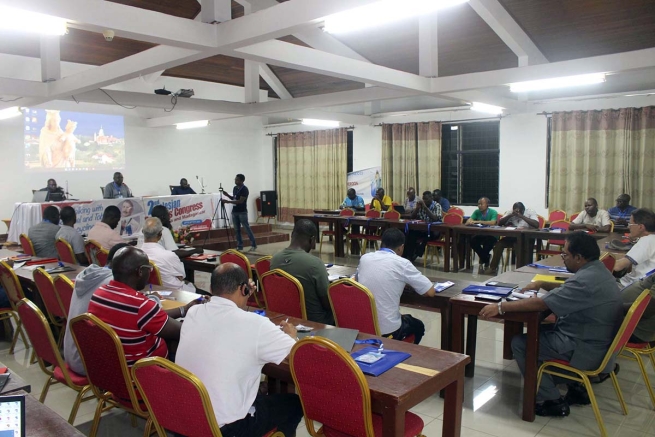The opening ceremony began with Evening Prayer in honour of Mary Help of Christians on Wednesday, 24 May, followed by the presentation of the general program by the organisers. The warm words of welcome from Bro. Albert Ramadan, who expressed his gratitude to all participants, marked the beginning of the event, while the opening address by the Superior of the Our Lady of Africa Vice-Province of Equatorial Tropical Africa, Fr Roland Mintsa, expressed the appropriate tone and spirit for the days to come.
The first day congress work, Thursday 25 May 2023, was dedicated to exploring the vocation of the religious brother in the Church.
Sister Gertrude Kana Bella led the morning session on the subject of “The vocation of the religious brother in the Church”. In her address she highlighted the beauty of this vocation, underlining its profound theological and human significance. The term “religious brother” embodies both rootedness in God, in the context of the fraternal Church willed by Christ, and the deep bond of consanguinity between brothers. The term thus conveys the affection, closeness and deep bond between religious brothers and other members of the community.
The participants were then divided into groups to share their reflections on how to make the vocation of the Salesian Brother more visible in today's world. The discussions highlighted the importance of living one's vocation with joy, overcoming any complex and consciously taking up one's mission in the Church. The importance of cultivating a deep relationship with God and of pursuing ongoing formation to face the specific challenges of the vocation of the Salesian Brother was given emphasis. Finally, stress was also placed on the sharing of talents, in a spirit of complementarity, with Salesian priests.
The afternoon featured a study of the history of the Salesian Brother and the forms of the Salesian vocation. Bro. Ramadan and Fr Ela André conducted this twofold theme. The former traced the evolution of the Brother throughout the history of the Congregation, basing his presentation on the writings of Don Bosco, texts of Rectors Major and documents of various General Chapters. The latter presented key considerations on the two forms of the one Salesian vocation, highlighting the factors that led to the emergence of this form, such as the growing need for human resources, openness to the laity and the immensity of the Salesian mission.
After their addresses, the speakers listened to questions and contributions from the participants. These enriched the discussions and collective reflections, and the speakers offered clarifications. In conclusion, it was recalled that both options have their value, and that it is essential to understand the vocation of the Salesian Brother for what is in itself: a personal response to the call of God.
Gaëtan Lwamba, SDB


